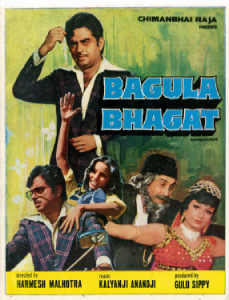This article needs additional citations for verification .(May 2019) |
| Bagula Bhagat | |
|---|---|
 | |
| Directed by | Harmesh Malhotra |
| Starring | |
| Music by | Kalyanji-Anandji |
Release date |
|
| Country | India |
| Language | Hindi |
Bagula Bhagat is a 1979 Bollywood action film thriller directed by Harmesh Malhotra. The film stars Ashok Kumar, Kamini Kaushal, Shatrughan Sinha and Shabana Azmi in lead roles.